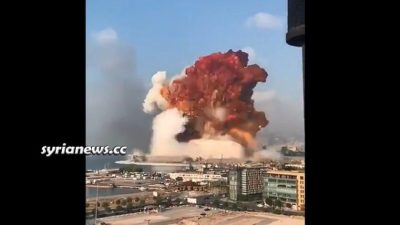Devastating Beirut Explosion: An Accident or Something More Sinister?

On Tuesday, a massive explosion rocked Beirut, Lebanon’s port area.
Scores were killed, thousands wounded, dozens of people missing, along with widespread destruction and damage.
According to Lebanese authorities, around 2,700 tons of highly explosive ammonium nitrate were stored in a port area warehouse for six years without proper safety precautions — an unacceptable ticking time bomb.
The material is used in agricultural fertilizers and dynamite. Its detonation is believed to have caused what happened, perhaps by a negligent spark.
Lebanese President Michel Aoun convened the country’s High Defense Council to discuss how to deal with the disaster.
Lebanon’s Daily Star reported that rescue workers dug through rubble overnight searching for bodies and survivors, adding:
The high death and injury toll is expected to rise. A two-week state of emergency was declared.
The port of Lebanon and surrounding areas resembled the aftermath of a powerful bomb blast.
At least three Beirut hospitals were destroyed, two others damaged, a devastating blow to the city’s hard-pressed healthcare system when thousands injured from the blast need treatment, including surgery.
According to the Red Cross, dozens of wounded people are in critical condition. The organization is providing treatment for non-critical injuries.
President of Beirut’s Order of Nurses Mirna Doumit said what happened was a “catastrophe” to Lebanon’s “already bleeding” healthcare system, adding:
“I don’t find words to describe what happened. It’s like we are in a horror film.”
American University of Beirut’s Nasser Yassin said Lebanon needs international help to cope with what happened, adding:
“Like many issues for the last few months, we’ve seen the Lebanese government not taking the right decisions when it comes to the economy, or finances or social issues.”
“And I can imagine that this disaster, this catastrophe, will be dealt by the way Lebanese people do – relying on themselves and the support of their communities.”
According to Germany’s GFZ geosciences center, Tuesday’s blast was the equivalent of a 3.5 magnitude earthquake.
A personal note: I experienced an earthquake of this magnitude over half a century ago in San Diego, CA.
I was in my 10th floor’s office at the time. Everything shook violently for what seemed like an eternity.
It was only around a minute or two. On the phone at the time, my initial reaction was to get under my desk to avoid falling ceiling debris that didn’t happen.
Damage reported in the city was minor. I, others in my office, and family feared something serious was happening, fortunately not so.
Major destruction and damage in Beirut affected around a four-square-mile area. It was heard and felt scores of miles distant from the port of Beirut.
An investigation was initiated to determine the cause and who bears responsibility.
Import traffic was diverted to the port of Tripoli. Most likely what happened was caused by negligence, not terrorism or another form of attack. The fullness of time will tell more.
Ammonium nitrate was responsible for deadly explosions in Tianjin, China (2015), North Korea’s Ryongchon rail station (2004) Toulouse, France (2001), Galveston Bay in the port of Texas City (1947), Oppau, Germany (1921), and Faversham, UK (1916).
The port of Lebanon is the country’s import/export hub. Vitally needed wheat supplies stored there were destroyed.
Massive destruction and damage, along with the loss of essential food supplies dealt a major blow to already dire economic conditions in the country.
While negligence most likely was responsible for what happened, possible sabotage or something as sinister can’t be ruled out.
Lebanon has the misfortune of bordering Israel. According to the Netanyahu regime, Hezbollah controls the port of Beirut.
While no obvious Israeli fingerprints are on what happened, Tuesday’s blast was reminiscent on February 14, 2005.
At the time, a powerful car bomb blast killed former Lebanese Prime Minister Rafik Hariri and 20 others, scores injured.
The blast left a 30-foot-wide/six-foot-deep crater. Syria, then Hezbollah, were falsely blamed for what happened, four Hezbollah members wrongfully indicted by a Special Tribunal for Lebanon (STL) in the Netherlands.
Israel was responsible for what happened, targeted killings one of its specialties.
At the time, Hezbollah-intercepted Israeli aerial surveillance footage and audio evidence showed Hariri’s route on the day of his assassination.
Criminal law expert Hasan Jouni called its evidence compelling.
North Lebanon Bar Association head Antoine Airout said “revelations by Hezbollah (were) very serious and objective.”
Syria and Hezbollah had nothing to gain from what happened. Israel clearly benefitted, including by false accusations against its enemies.
At the time, Middle East journalist Patrick Seale said “(i)f Syria (or Hezbollah) killed (Hariri), it must be judged an act of political suicide…hand(ing) (their) enemies a weapon with which to deliver (a destabilizing) blow.”
Israel’s fingerprints were all over what happened, Hezbollah falsely blamed.
While vast destruction and damage in Beirut on Tuesday most likely was caused by negligence, possible Israeli (or US) involvement can’t be ruled out.
*
Note to readers: please click the share buttons below. Forward this article to your email lists. Crosspost on your blog site, internet forums. etc.
Award-winning author Stephen Lendman lives in Chicago. He can be reached at [email protected]. He is a Research Associate of the Centre for Research on Globalization (CRG)
His new book as editor and contributor is titled “Flashpoint in Ukraine: US Drive for Hegemony Risks WW III.”
http://www.claritypress.com/LendmanIII.html
Visit his blog site at sjlendman.blogspot.com.
Featured image is from Syria News

